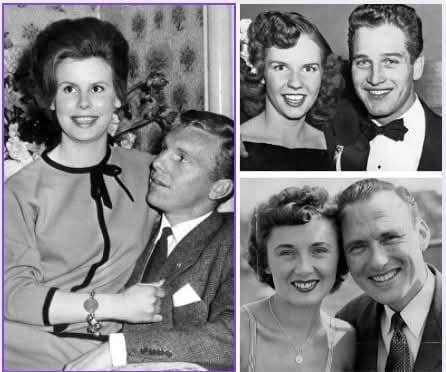A bright-eyed young actor, Paul Newman, fresh from military service, crossed paths with a determined young woman named Jacqueline “Jackie” Witte on a summer theater stage in the late 1940s. At the time, Paul was 24 and Jackie just 19, both brimming with ambition and dreams of a life in the arts. Their chemistry was immediate—a spark that quickly grew into a partnership rooted in mutual aspirations and the desire to navigate the challenges of a post-war world together. Theirs was not a storybook romance, but the kind of real, urgent connection that forms when two people see in each other a chance for stability and purpose.
In the early years, Jackie became the rock in Paul’s life. She stood by him as he pursued acting training at Yale, all while raising their growing family. Together, they welcomed three children: Scott, Susan, and Stephanie. Jackie managed the household, offering a steady presence and a nurturing home, while Paul chased opportunities in theater and, eventually, film. She was not just his wife but his anchor, making it possible for him to chase his dreams without losing sight of what mattered most.
But as Paul’s star began to rise in Hollywood, thanks to breakthrough roles like “Somebody Up There Likes Me,” the dynamics between them shifted. It was during this period of growing fame that Paul met Joanne Woodward, another actress whose warmth and talent would change the course of his life. What started as a professional collaboration soon evolved into something deeper, pulling Paul in two directions. Jackie, ever perceptive, noticed the growing distance—letters went unanswered, phone calls became rare, and Paul’s absences grew longer. The marriage, once a source of comfort and shared ambition, began to unravel.
The decision to part ways did not come easily, but by 1958, Paul and Jackie’s marriage had come to an end. That same year, Paul married Joanne Woodward, marking the beginning of a new chapter. For Jackie, it was a painful transition—the loss not only of a marriage but of the dreams she and Paul had once nurtured together. She retreated from the public eye, choosing a life of quiet dignity and privacy. Unlike so many in her position, Jackie never sought attention or sympathy, never shared her story with the media, and remained devoted to her children.
Their eldest child, Scott, struggled deeply in the aftermath of his parents’ separation, grappling with his identity and the weight of his father’s fame. His life was tragically cut short by addiction, passing away at 28. Paul, devastated by the loss, established the Scott Newman Center to help others facing similar struggles. Susan and Stephanie, meanwhile, lived more private lives, though Susan would later engage in advocacy and documentary work.
Jackie Witte never remarried. She lived quietly, far from the glamour of Hollywood, and remained close to her daughters. Though rumors circulated about her work in education and community service in her later years, she maintained her privacy to the end. She passed away in 2019, her story largely untold, her presence in Paul’s life often overlooked by a world more captivated by his later fame and enduring romance with Joanne Woodward.
Paul Newman’s legacy as a Hollywood legend was cemented by the time of his death in 2008. But Jackie’s influence on his early journey—her steadfast support, her sacrifices, and the family they built—remained an indelible part of his life, even if it was seldom acknowledged publicly.
Jackie Witte’s story stands as a quiet testament to the depth of love and sacrifice that often goes unseen, lived not on the silver screen, but in the real and tender spaces of the heart.
